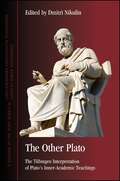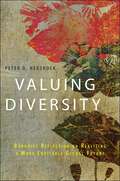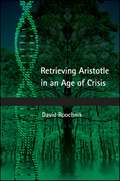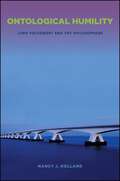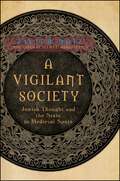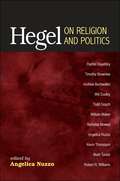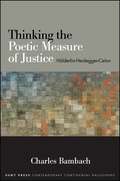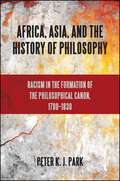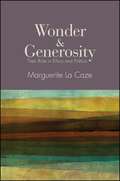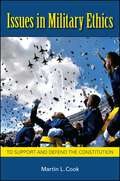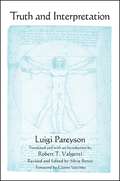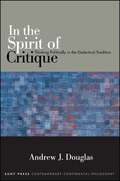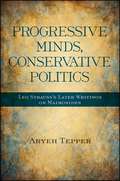- Table View
- List View
The Other Plato: The Tübingen Interpretation of Plato's Inner-Academic Teachings (SUNY series in Contemporary Continental Philosophy)
by Dmitri NikulinOffering a provocative alternative to the dominant approaches of Plato scholarship, the Tübingen School suggests that the dialogues do not tell the full story of Plato's philosophical teachings. Texts and fragments by his students and their followers—most famously Aristotle's Physics—point to an "unwritten doctrine" articulated by Plato at the Academy. These unwritten teachings had a more systematic character than those presented in the dialogues, which according to this interpretation were meant to be introductory. The Tübingen School reconstructs a historical, critical, and systematic account of Plato that takes into account testimony about these teachings as well as the dialogues themselves. The Other Plato collects seminal and more recent essays by leading proponents of this approach, providing a comprehensive overview of the Tübingen School for English readers.
The Orders of Nature
by Lawrence CahooneWinner of the 2015 John N. Findlay Award in Metaphysics presented by the Metaphysical Society of AmericaReviving and modernizing the tradition of post Darwinian naturalism, The Orders of Nature draws on philosophy and the natural sciences to present a naturalistic theory of reality. Conceiving of nature as systems, processes, and structures that exhibit diverse properties that can be hierarchically arranged, Lawrence Cahoone sketches a systematic metaphysics based on the following orders of nature: physical, material, biological, mental, and cultural. Using recent work in the science of complexity, hierarchical systems theory, and nonfoundational approaches to metaphysics, Cahoone analyzes these orders with explanations of the underlying science, covering a range of topics that includes general relativity and quantum field theory; chemistry and inorganic complexity; biology and telenomic explanation, or "purpose"; the theory of mind and mental causation as an animal phenomenon; and the human mind's unique cultural abilities. The book concludes with an exploration of what answers such a theory of naturalism can provide to questions about values and God.
Aesthetics of the Virtual (SUNY series in Contemporary Italian Philosophy)
by Roberto DiodatoArguing that the virtual body is something new—namely, an entity that from an ontological perspective has only recently entered the world—Roberto Diodato considers the implications of this kind of body for aesthetics. Virtual bodies insert themselves into the space opened up by the famous distinction in Aristotle's Physics between natural and artificial beings—they are both. They are beings that are simultaneously events; they are images that are at once internal and external; they are ontological hybrids that exist only in the interaction between logical-computational text and human bodies endowed with technological prostheses. Pursuing this line of thought, Diodato reconfigures classic aesthetic concepts such as mimesis, representation, the relation between illusion and reality, the nature of images and imagination, and the theory of sensory knowledge.
Essays on Hegel's Philosophy of Subjective Spirit
by David S. SternAlthough Hegel considered his philosophy of subjective spirit to be of particular importance, it has been the focus of little present-day scholarship, particularly in English. Recent editorial work associated with the publication of a new edition of Hegel's Gesammelte Werke and the discovery and translation of a transcript of one of his lecture courses on the topic, however, have set the stage for a fresh encounter with this fascinating and wide-ranging component of his thought. Taking up questions central to the philosophy of mind and body and to the philosophy of psychology, the Philosophy of Subjective Spirit includes discussions of feelings and emotions, consciousness, habit and free will, and rationality—as well as madness, dreams, and the paranormal. Situating Hegel's philosophy on the topic in relation to the rest of his work, to his contemporaries, and to current philosophy of mind and psychology, this volume demonstrates its richness as a focus of study and paves the way for a new direction in Hegel scholarship.
Beauvoir and Western Thought from Plato to Butler
by Shannon M. Mussett William S. WilkersonDespite a deep familiarity with the philosophical tradition and despite the groundbreaking influence of her own work, Simone de Beauvoir never embraced the idea of herself as a philosopher. Her legacy is similarly complicated. She is acclaimed as a revolutionary thinker on issues of gender, age, and oppression, but although much has been written weighing the influence she and Jean-Paul Sartre had on one another, the extent and sophistication of her engagement with the Western tradition broadly goes mostly unnoticed. This volume turns the spotlight on exactly that, examining Beauvoir's dialogue with her influences and contemporaries, as well as her impact on later thinkers—concluding with an autobiographical essay by bell hooks discussing the influence of Beauvoir's philosophy and life on her own work and career. These innovative essays both broaden our understanding of Beauvoir and suggest new ways of understanding canonical figures through the lens of her work.
Valuing Diversity: Buddhist Reflection on Realizing a More Equitable Global Future
by Peter D. HershockDiversity matters. Whether in the context of ecosystems, education, the workplace, or politics, diversity is now recognized as a fact and as something to be positively affirmed. But what is the value of diversity? What explains its increasing significance? Valuing Diversity is a groundbreaking response to these questions and to the contemporary global dynamics that make them so salient.Peter D. Hershock examines the changes of the last century to show how the successes of Western-style modernity and industrially-powered markets have, ironically, coupled progressive integration and interdependence with the proliferation of political, economic, social, cultural, and environmental differences. Global predicaments like climate change and persistent wealth inequalities compel recognition that we are in the midst of an era-defining shift from the primacy of the technical to that of the ethical. Yet, neither modern liberalism nor its postmodern critiques have offered the resources needed to address such challenges.Making use of Buddhist and ecological insights, Valuing Diversity develops a qualitatively rich conception of diversity as an emerging value and global relational commons, forwarding an ethics of interdependence and responsive virtuosity that opens prospects for a paradigm shift in our pursuits of equity, freedom, and democratic justice.
Retrieving Aristotle in an Age of Crisis (SUNY series in Ancient Greek Philosophy)
by David RoochnikIn 1935 Edmund Husserl delivered his now famous lecture "Philosophy and the Crisis of European Humanity," in which he argued that the "misguided rationalism" of modern Western science, dominated by the model of mathematical physics, can tell us nothing about the "meaning" of our lives. Today Husserl's conviction that the West faces a crisis is no longer an abstraction. With the ever-present threat of nuclear explosion, the degradation of the oceans, and the possibility that climate change will wreak havoc on civilization itself, people from all walks of life are wondering what has gone so terribly wrong and what remedies might be available.In Retrieving Aristotle in an Age of Crisis, David Roochnik makes a lucid and powerful case that Aristotle offers a philosophical resource that even today can be of significant therapeutic value. Unlike the scientific revolutionaries of the seventeenth century, he insisted that both ordinary language and sense-perception play essential roles in the acquisition of knowledge. Centuries before Husserl, Aristotle was a phenomenologist who demanded that a successful theory remain faithful to human experience. His philosophy can thus provide precisely what modern European rationalism now so painfully lacks: an understanding and appreciation of the world in which human beings actually make their homes.
The Kyoto School: An Introduction
by Robert E. CarterThis book provides a much-needed introduction to the Kyoto School of Japanese philosophy. Robert E. Carter focuses on four influential Japanese philosophers: the three most important members of the Kyoto School (Nishida Kitarō, Tanabe Hajime, and Nishitani Keiji), and a fourth (Watsuji Tetsurō), who was, at most, an associate member of the school. Each of these thinkers wrestled systematically with the Eastern idea of "nothingness," albeit from very different perspectives.Many Western scholars, students, and serious general readers are intrigued by this school of thought, which reflects Japan's engagement with the West. A number of works by various thinkers associated with the Kyoto School are now available in English, but these works are often difficult to grasp for those not already well-versed in the philosophical and historical context. Carter's book provides an accessible yet substantive introduction to the school and offers an East-West dialogue that enriches our understanding of Japanese thought while also shedding light on our own assumptions, habits of thought, and prejudices.
Ontological Humility: Lord Voldemort and the Philosophers
by Nancy J. HollandNeither self-effacing modesty nor religious meekness, ontological humility is a moral and philosophical attitude toward transcendence—the unknown and unknowable background of existence—and a recognition and awareness of the contingency and chance that influence the course of our lives. It is a concept that Nancy J. Holland finds both throughout the history of philosophy and across the volumes of J. K. Rowling's Harry Potter series. Tracing it through the philosophical thought of figures ranging from Descartes, Hume, and Kant to Heidegger, Beauvoir, Merleau-Ponty, and Derrida, Holland uses the Harry Potter saga as a guide to illustrate the concept, revealing a whole set of ethical imperatives. Connecting the concept to contemporary gender and race theory, she demonstrates its implications both for our understanding of the philosophical tradition and for the way we live our own lives.
A Vigilant Society: Jewish Thought and the State in Medieval Spain
by Javier RoizA Vigilant Society presents a provocative hypothesis that argues that Western society as we know it emerged from the soil of Jewish intellectual advances in the thirteenth century, especially those formulated on the Iberian Peninsula. A paradigmatic shift began to occur, one that abandoned the pre–Gothic Sephardic wisdom found in, for example, the writings of Maimonides in favor of what author Javier Roiz calls the "vigilant society." This model embraces a conception of politics that includes a radical privatization of an individual's interior life and—especially as adopted and adapted in later centuries by Roman Catholic and Calvinist thinkers—is marked by a style of politics that accepts the dominance of power and control as given. Vigilant society laid the foundation for the Western understanding of politics and its institutions and remains pervasive in today's world.
Hegel on Religion and Politics
by Angelica NuzzoAlthough scholars have written extensively on Hegel's treatment of religion and politics separately, much less has been written about the connections between the two in his thought. Religion in Hegel's philosophy occupies a difficult position relative to politics, existing both within the ethical and historical reality of the state and at the same time maintaining an absolute, transcendent identity. In addition, Hegel's views on the relationship between the two were often revised and refined over time in both his written works and his lectures. His thinking on the subject, however, provides a fascinating look at an element of his practical philosophy that was as controversial in his time as it is in ours. This book highlights various approaches to this intersection in Hegel's thought and evaluates its relevance to contemporary problems, considering issues such as religious pluralism and tolerance, conflicts between Islam and Christianity, and tensions between the secular and religious state.
Thinking the Poetic Measure of Justice: Hölderlin-Heidegger-Celan (SUNY series in Contemporary Continental Philosophy)
by Charles BambachWhat is the measure of ethics? What is the measure of justice? And how do we come to measure the immeasurability of these questions? Thinking the Poetic Measure of Justice situates the problem of justice in the interdisciplinary space between philosophy and poetry in an effort to explore the sources of ethical life in a new way. Charles Bambach engages the works of two philosophical poets who stand as the bookends of modernity—Friedrich Hölderlin (1770–1843) and Paul Celan (1920–1970)—offering close textual readings of poems from each that define and express some of the crucial problems of German philosophical thought in the twentieth century: tensions between the native and the foreign, the proper and the strange, the self and the other. At the center of this philosophical conversation between Hölderlin and Celan, Bambach places the work of Martin Heidegger to rethink the question of justice in a nonlegal, nonmoral register by understanding it in terms of poetic measure. Focusing on Hölderlin's and Heidegger's readings of pre-Socratic philosophy and Greek tragedy, as well as on Celan's reading of Kabbalah, he frames the problem of poetic justice against the trauma of German destruction in the twentieth century.
On the Ethics of Torture
by Uwe SteinhoffThe question of when, and under what circumstances, the practice of torture might be justified has received a great deal of attention in the last decade in both academia and in the popular media. Many of these discussions are, however, one-sided with other perspectives either ignored or quickly dismissed with minimal argument. In On the Ethics of Torture, Uwe Steinhoff provides a complete account of the philosophical debate surrounding this highly contentious subject. Steinhoff's position is that torture is sometimes, under certain narrowly circumscribed conditions, justified, basing his argument on the right to self-defense. His position differs from that of other authors who, using other philosophical justifications, would permit torture under a wider set of conditions. After having given the reader a thorough account of the main arguments for permitting torture under certain circumstances, Steinhoff explains and addresses the many objections that have been raised to employing torture under any circumstances. This is an indispensible work for anyone interested in one of the most controversial subjects of our times.
Derrida and Joyce: Texts and Contexts (SUNY series in Contemporary French Thought)
by Andrew J. Mitchell Sam SloteBringing together all of Jacques Derrida's writings on James Joyce, this volume includes the first complete translation of his book Ulysses Gramophone: Two Words for Joyce as well as the first translation of the essay "The Night Watch." In Ulysses Gramophone, Derrida provides some of his most thorough reflections on affirmation and the "yes," the signature, and the role of technological mediation in all of these areas. In "The Night Watch," Derrida pursues his ruminations on writing in an explicitly feminist direction, offering profound observations on the connection between writing and matricide. Accompanying these texts are nine essays by leading scholars from across the humanities addressing Derrida's treatments of Joyce throughout his work, and two remembrances of lectures devoted to Joyce that Derrida gave in 1982 and 1984. The volume concludes with photographs of Derrida from these two events.
Africa, Asia, and the History of Philosophy: Racism in the Formation of the Philosophical Canon, 1780–1830 (SUNY series, Philosophy and Race)
by Peter K. ParkWinner of the 2016 Frantz Fanon Prize for Outstanding Book in Caribbean Thought presented by the Caribbean Philosophical AssociationIn this provocative historiography, Peter K. J. Park provides a penetrating account of a crucial period in the development of philosophy as an academic discipline. During these decades, a number of European philosophers influenced by Immanuel Kant began to formulate the history of philosophy as a march of progress from the Greeks to Kant—a genealogy that supplanted existing accounts beginning in Egypt or Western Asia and at a time when European interest in Sanskrit and Persian literature was flourishing. Not without debate, these traditions were ultimately deemed outside the scope of philosophy and relegated to the study of religion. Park uncovers this debate and recounts the development of an exclusionary canon of philosophy in the decades of the late eighteenth and early nineteenth centuries. To what extent was this exclusion of Africa and Asia a result of the scientization of philosophy? To what extent was it a result of racism?This book includes the most extensive description available anywhere of Joseph-Marie de Gérando's Histoire comparée des systèmes de philosophie, Friedrich Schlegel's lectures on the history of philosophy, Friedrich Ast's and Thaddä Anselm Rixner's systematic integration of Africa and Asia into the history of philosophy, and the controversy between G. W. F. Hegel and the theologian August Tholuck over "pantheism."
The Thou of Nature: Religious Naturalism and Reverence for Sentient Life
by Donald A. CrosbyHumans share the earth with nonhuman animals who are also capable of conscious experience and awareness. Arguing that we should develop an I-thou, not an I-it, relationship with other sentient beings, Donald A. Crosby adds a new perspective to the current debates on human/animal relations and animal rights—that of religious naturalism. Religion of Nature holds that the natural world is the only world and that there is no supernatural animus or law behind it. From this vantage point, our fellow thous are entitled to more than merely moral treatment: protection and enhancement of their continuing well-being deserves to be a central focus of religious reverence, care, and commitment as well. A set of presumptive natural rights for nonhuman animals is proposed and conflicts in applying these rights are acknowledged and considered. A wide range of situations involving humans and nonhuman animals are discussed, including hunting and fishing; eating and wearing; circuses, rodeos, zoos, and aquariums; scientific experimentation; and the threats of human technology and population growth.
Wonder and Generosity: Their Role in Ethics and Politics
by Marguerite La CazeWonder and Generosity provides a fresh account of how the passions of wonder—based on accepting others' differences—and generosity—based on self-respect and mutual respect—can supplement each other to establish an ethics and politics of respect for sexual and cultural differences. Drawing on the work of both historical and contemporary thinkers, such as Descartes, Kant, Beauvoir, Arendt, Irigaray, and Derrida, Marguerite La Caze applies her theoretical framework to a range of contemporary political challenges, including asylum-seeker policies, justice for indigenous and other oppressed groups, debates over official apologies, gender equality, and responses to radical evil. La Caze's book contributes to understanding the relationship between equality and difference in public life, the extent to which we must regard others as similar in the name of equality, and the extent to which we must acknowledge significant differences.
Issues in Military Ethics: To Support and Defend the Constitution
by Martin L. CookReflecting on a seventeen-year career teaching at military educational institutions of the Air Force, the Army, and the Navy, Martin L. Cook finds a powerful but underappreciated basis for military ethics in the oath to the Constitution that members of the armed services pledge. In Issues in Military Ethics, Cook considers the role of airpower in counterinsurgency war and the place of robotic weapons systems on the battlefield, but he also looks beyond ethics in the conduct of war to issues arising in military life generally. He addresses a range of other issues with pressing contemporary relevance, including civil-military relations, ethics education, and religion, in particular the ascendency of evangelical Christianity in military culture. This volume serves as an important resource for scholars, members of the armed services, and educators alike.
Truth and Interpretation (SUNY series in Contemporary Italian Philosophy)
by Luigi PareysonLuigi Pareyson (1918–1991) was one of the most important Italian philosophers to emerge after World War II and stands shoulder to shoulder with fellow hermeneutic thinkers Hans-Georg Gadamer and Paul Ricoeur. The product of a well-developed theory of interpretation that stretches back to the late 1940s, his 1971 masterpiece Truth and Interpretation provides the historical impetus and theoretical framework for the questions of existence, art, and politics that would motivate his most famous students, Umberto Eco and Gianni Vattimo. In a time when the meaning of truth as an interpretation is challenged by the chaotic din of media on the one side and the violent force of absolute claims from science, religion, and political economy on the other, Pareyson's meditation on the value of thinking that is shaped by the traditions of philosophy and yet responds to contemporary demands remains timely and pressing more than forty years after its initial publication.
Fichte's Vocation of Man: New Interpretive and Critical Essays
by Daniel Breazeale; Tom RockmoreWritten for a general audience during a period of intense controversy in the German philosophical community, J. G. Fichte's short book The Vocation of Man (1800) is both an introduction to and a defense of his philosophical system, and is one of the best-known contributions to German Idealism. This collection of new essays reflects a wide and instructive variety of philosophical and hermeneutic approaches, which combine to cast new light upon Fichte's familiar text. The contributors highlight some of the overlooked complexities and implications of The Vocation of Man and situate it firmly within the intellectual context within which it was originally written, relating it to the positions of Kant, Hegel, Schelling, Schlegel, Jacobi, and others. In addition, the essays relate the text to issues of contemporary concern such as the limits of language, the character of rational agency, the problem of evil, the relation of theoretical knowledge to practical belief, and the dialectic of judgment.
Dramatic Experiments: Life according to Diderot (SUNY series in Contemporary French Thought)
by Eyal PeretzDramatic Experiments offers a comprehensive study of Denis Diderot, one of the key figures of European modernity. Diderot was a French Enlightenment philosopher, dramatist, art critic, and editor of the first major modern encyclopedia. He is known for having made lasting contributions to a number of fields, but his body of work is considered too dispersed and multiform to be unified. Eyal Peretz locates the unity of Diderot's thinking in his complication of two concepts in modern philosophy: drama and the image. Diderot's philosophical theater challenged the work of Plato and Aristotle, inaugurating a line of drama theorists that culminated in the twentieth century with Bertolt Brecht and Antonin Artaud. His interest in the artistic image turned him into the first great modern theorist of painting and perhaps the most influential art critic of modernity. With these innovations, Diderot provokes a rethinking of major philosophical problems relating to life, the senses, history, and appearance and reality, and more broadly a rethinking of the relation between philosophy and the arts. Peretz shows Diderot to be a radical thinker well ahead of his time, whose philosophical effort bears comparison to projects such as Gilles Deleuze's transcendental empiricism, Martin Heidegger's fundamental ontology, Jacques Derrida's deconstruction, and Jacques Lacan's psychoanalysis.
Goodbye, Kant!: What Still Stands of the Critique of Pure Reason (SUNY series in Contemporary Italian Philosophy)
by Maurizio FerrarisA best seller in Italy, Maurizio Ferraris's Goodbye, Kant! delivers a nontechnical, entertaining, and occasionally irreverent overview of Immanuel Kant's Critique of Pure Reason. He borrows his title from Wolfgang Becker's Goodbye Lenin!, the 2003 film about East Germany after the fall of the Berlin Wall, which depicts both relief at the passing of the Soviet era and affection for the ideals it embodied. Ferraris approaches Kant in similar spirits, demonstrating how the structure that Kant elaborates for the understanding of human knowledge can generate nostalgia for lost aspirations, while still leaving room for constructive criticism. Isolating key themes and concerns in the work, Ferraris evaluates Kant's claims relative to what science and philosophy have come to regard as the conditions for knowledge and experience in the intervening two centuries. He remains attentive to the historical context and ideals from which Kant's Critique emerged but also resolute in identifying what he sees as the limits and blind spots in the work. The result is an accessible account of a notoriously difficult book that will both provoke experts and introduce students to the work and to these important philosophical debates about the relations of experience to science.
Beyond Oneness and Difference: Li and Coherence in Chinese Buddhist Thought and Its Antecedents (SUNY series in Chinese Philosophy and Culture)
by Brook ZiporynBeyond Oneness and Difference considers the development of one of the key concepts of Chinese intellectual history, Li. A grasp of the strange history of this term and its seemingly conflicting implications—as oneness and differentiation, as the knowable and as what transcends knowledge, as the good and as the transcendence of good and bad, as order and as omnipresence—raises questions about the most basic building blocks of our thinking. This exploration began in the book's companion volume, Ironies of Oneness and Difference, which detailed how formative Confucian and Daoist thinkers approached and demarcated concepts of coherence, order, and value, identifying both ironic and non-ironic trends in the elaboration of these core ideas. In the present volume, Brook Ziporyn goes on to examine the implications of Li as they develop in Neo-Daoist metaphysics and in Chinese Buddhism, ultimately becoming foundational to Song and Ming dynasty Neo-Confucianism, the orthodox ideology of late imperial China. Ziporyn's interrogation goes beyond analysis to reveal the unsuspected range of human thinking on these most fundamental categories of ontology, metaphysics, epistemology, and ethics.
In the Spirit of Critique: Thinking Politically in the Dialectical Tradition (SUNY series in Contemporary Continental Philosophy)
by Andrew J. DouglasFocusing on the critical postures of Hegel, Marx, and a series of twentieth-century intellectuals, including Sartre, Adorno, and C. L. R. James, this book explores what dialectical thinking entails and how such thinking might speak to the lived realities of the contemporary political moment. What is revealed is not a formal method or a grand philosophical system, but rather a reflective energy or disposition—a dialectical spirit of critique—that draws normative sustenance from an emancipatory moral vision but that remains attuned principally to conflict and tension, and to the tragic uncertainties of political life. In light of the unique challenges of the late-modern age, as theorists and citizens struggle to sustain an active and coherent critical agenda, In the Spirit of Critique invites serious reconsideration of a rich and elusive intellectual tradition.
Progressive Minds, Conservative Politics: Leo Strauss's Later Writings on Maimonides (SUNY series in the Thought and Legacy of Leo Strauss)
by Aryeh TepperLeo Strauss (1899–1973), one of the preeminent political philosophers of the twentieth century, was an astute interpreter of Maimonides's medieval masterpiece, The Guide of the Perplexed. In Progressive Minds, Conservative Politics, Aryeh Tepper overturns the conventional view of Strauss's interpretation and of Strauss's own mature thought. According to the scholarly consensus, Strauss traced the well-known contradictions in the Guide to the fundamental tension in Maimonides's mind between reason and revelation, going so far as to suggest that while the Jewish philosopher's overt position was religiously pious (i.e., on the side of "Jerusalem"), secretly he was on the side of reason, or "Athens." In Tepper's analysis, Strauss's judgments emerge as much more complex than this and also more open to revision. In his later writings, Tepper shows, Strauss pointed to contradictions in Maimonides's thought not only between but also within both "Jerusalem" and "Athens." Moreover, Strauss identified, and identified himself with, an esoteric Maimonidean teaching on progress: progress within the Bible, beyond the Bible, and even beyond the rabbinic sages. Politically a conservative thinker, Strauss, like Maimonides, located man's deepest satisfaction in progressing in the discernment of the truth. In the fullness of his career, Strauss thus pointed to a third way beyond the modern alternatives of conservatism and progressivism.
